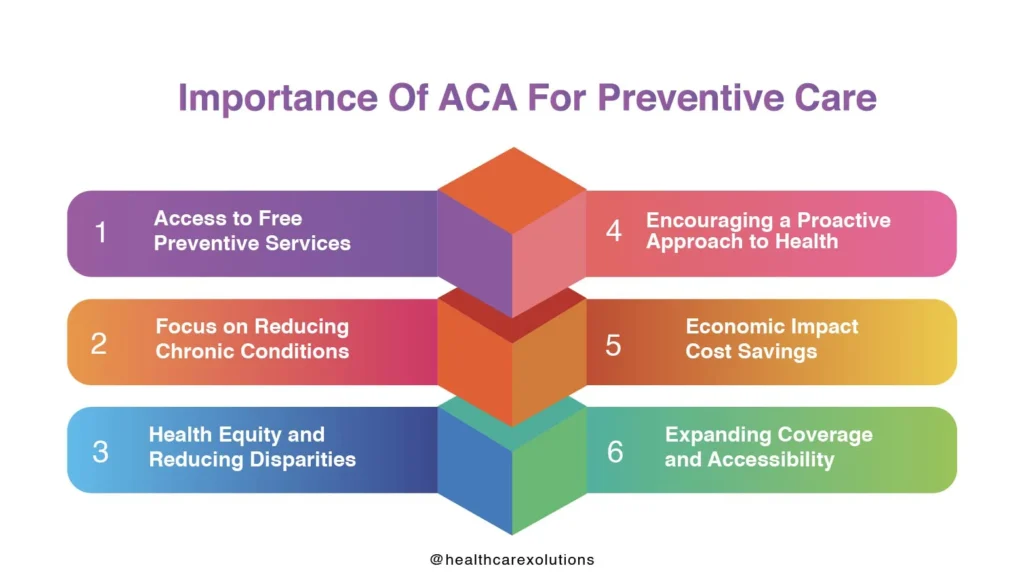Preventive Care: Why ACA Insurance is a Game-Changer?

The Affordable Care Act (ACA), enacted in 2010, transformed the healthcare landscape in the United States by expanding access to insurance and making preventive care a central component of its strategy. Preventive care, which includes services like screenings, immunizations, and regular check-ups, plays a pivotal role in improving the overall health of individuals and reducing long-term healthcare costs. ACA’s emphasis on making preventive services accessible to millions of Americans has been a game-changer for public health and the economy.
In this article, we’ll delve into why ACA insurance has revolutionized preventive care, the benefits it provides, and how it impacts both individuals and the healthcare system as a whole.
Key Takeaways:
- Free Preventive Services: The ACA mandates that preventive services, like screenings and vaccinations, are covered at no cost to the patient.
- Chronic Disease Prevention: By providing early detection and management services, the ACA helps reduce the burden of chronic diseases like diabetes and heart disease.
- Health Equity: The ACA has expanded access to preventive care for underserved and low-income populations, reducing healthcare disparities.
- Proactive Health Approach: The focus on preventive services encourages individuals to take a proactive approach to their health.
- Cost Savings: Preventive care saves money by reducing the need for expensive treatments for advanced diseases.
- Wider Insurance Coverage: By expanding Medicaid and offering marketplace insurance, the ACA has significantly increased the number of Americans with access to preventive care.
What is Preventive Care?

Preventive care encompasses a broad range of medical services designed to prevent illness and detect health problems at an early stage. These services include routine physical exams, vaccinations, screenings (for conditions like cancer, diabetes, and high blood pressure), and counseling for health-related issues like smoking cessation and obesity management.
The goal of preventive care is simple: to keep people healthy, reduce the risk of developing chronic conditions, and ensure early diagnosis of potentially life-threatening diseases. Early detection often results in more effective treatment and better health outcomes.
How ACA Promotes Preventive Care?
One of the hallmark features of the ACA is that it requires health insurance plans to cover a variety of preventive services at no cost to the patient. This includes services like mammograms, cholesterol screenings, vaccinations, and counseling for smoking cessation and diet management. By eliminating co-pays and deductibles for preventive services, the ACA ensures that financial barriers don’t prevent individuals from seeking the care they need.
This is a significant shift from pre-ACA times when preventive care was often underutilized due to the associated out-of-pocket costs. Many Americans would skip routine screenings or delay preventive visits because of high co-pays, leading to a rise in undetected or untreated health conditions.
Why ACA Insurance Is A Game-Changer For Preventive Care?

1. Access to Free Preventive Services:
The ACA mandates that insurers must cover preventive services without requiring the patient to share the cost. This has led to a significant increase in the utilization of these services, with millions of Americans taking advantage of free screenings and check-ups. The early detection of illnesses can lead to better treatment outcomes and reduce the overall cost of healthcare.
2. Focus on Reducing Chronic Conditions:
Chronic diseases, such as heart disease, diabetes, and cancer, are among the most common and costly health problems in the United States. Preventive care plays a key role in identifying risk factors early on, helping individuals manage or even avoid developing these conditions. By ensuring that more people have access to preventive services, the ACA has helped to reduce the incidence of chronic diseases, which has a long-term positive impact on public health and healthcare costs.
3. Health Equity and Reducing Disparities:
The ACA has had a notable effect on reducing healthcare disparities, particularly for historically underserved communities. Before the ACA, many low-income families and minority groups faced limited access to preventive care due to financial barriers. By expanding Medicaid and offering subsidized insurance plans through the marketplace, the ACA has allowed more Americans to receive essential preventive services, regardless of their income level or social status. This has led to better health outcomes across the board.
4. Encouraging a Proactive Approach to Health:
By making preventive care more accessible, the ACA encourages individuals to take a proactive approach to their health. People are more likely to schedule regular check-ups, get vaccinated, and participate in screening programs when they know that the services are covered. This proactive approach helps individuals stay on top of their health and avoid complications later in life.
5. Economic Impact: Cost Savings:
Preventive care not only saves lives, but it also saves money. By catching diseases in their early stages, patients can avoid expensive treatments that might be needed for advanced conditions. For example, the cost of treating advanced-stage cancer is far greater than the cost of regular screenings to detect it early. The ACA’s focus on preventive care has the potential to significantly reduce the financial burden on the healthcare system, as fewer people require emergency care or long-term treatment for conditions that could have been prevented or managed early on.
6. Expanding Coverage and Accessibility:
Before the ACA, many Americans did not have health insurance, and preventive care was often seen as a luxury. By expanding coverage to millions of previously uninsured individuals, the ACA has made preventive care a standard part of healthcare for a larger portion of the population. This expansion of coverage ensures that more people have the opportunity to lead healthier lives by accessing essential preventive services.
Conclusion:
The Affordable Care Act (ACA) has had a significant impact on the landscape of preventive care in the United States. By eliminating financial impediments, broadening access to healthcare services, and putting a greater emphasis on the early detection of health issues, the ACA has played a pivotal role in enabling millions of Americans to pursue and maintain healthier lifestyles. It’s important to recognize that preventive care represents a strategic investment in individuals’ long-term health and overall well-being. The unwavering commitment of the ACA to this proactive approach has left an indelible and far-reaching mark on the nation’s healthcare system.
